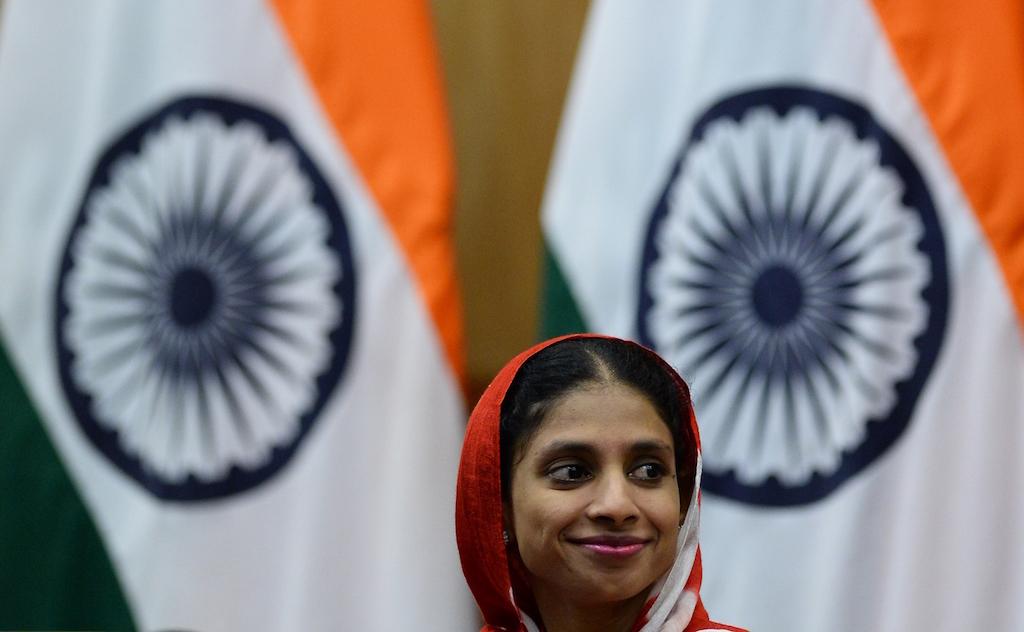Why it took a lost Indian girl 10 years — and a Bollywood movie — to get home
Geeta at a press conference in New Delhi on Oct. 26 shortly after her return to India from Pakistan for the first time in more than 10 years.
NEW DELHI, India — Bollywood movies are known for their bizarre plot twists and larger-than-life characters. But in the case of a young woman whose story has gripped India and Pakistan, real life is even stranger than the Bollywood blockbuster it seems to have inspired.
Geeta, now 23, was found as a girl over a decade ago by Pakistan border security personnel, alone on a train that runs between India and Pakistan. Geeta is deaf and has difficulty talking. Unable to tell the authorities where she came from, she was taken in by the Edhi Foundation, a Pakistani charitable organization.
How Geeta found herself on the other side of a secure border is unclear. Reports surmise that she accidentally boarded the train unnoticed and was found when the train stopped in Lahore.
Geeta spent the years since being cared for by the Edhi Foundation, which pieced together through her gesturing that the girl was actually from India. Efforts to reunite her with her family, however, were only taken up three years ago, when Pakistani rights activist Ansar Burney heard Geeta’s story and took on the task of looking for her family in India — without any luck.
Then Bollywood got hold of the story.
“Bajrangi Bhaijaan,” an Indian-made mega movie released in July, tells the tale of a mute Pakistani girl who is accidentally separated from her mother on a trip to India, and an Indian man’s quest to reunite her with her family. The film broke mainstream Bollywood norms by covering Pakistan and its people positively, and was an instant success in both countries.
Almost magically, the media and foreign ministries of both countries began paying attention to Geeta’s case, hunting for her relatives in India and speeding through repatriation procedures. The clincher came when Geeta identified photographs of one of several Indian families that claim her (though DNA tests have yet to confirm whether they are indeed related).
Greeted by India’s foreign minister and hordes of journalists, Geeta arrived in New Delhi on Oct. 26, just three months after “Bajrangi Bhaijaan” made her a cause célèbre. So what kept her in Pakistan all these years?
It wasn’t just Geeta’s silence. Almost 70 years after partition, India is Pakistan’s largest neighbor and many citizens of each country have family in the other. Crossing the 1,800-mile border between them, however, isn’t like walking over to Canada to get a better view of the Niagara Falls. The frontier between India and Pakistan is heavily guarded and almost impermeable.
There are only two direct flights from India to Pakistan, operated once a week. Neither connects the two capitals. Delhi and Islamabad are about the same distance apart as Washington, DC and Boston, but flying from one capital to the other involves a detour via Abu Dhabi or Bahrain and takes at least 10 hours.
The twice-weekly Samjhauta (“Compromise”) Express, on which both Geeta and her Bollywood version were found, is one of only two passenger trains which connect India and Pakistan. The opening of the route back in 1976 was hailed as a significant improvement in relations between the two countries. Since then, however, the line’s route has had changes, reductions in service and even all-out suspensions during tense security situations, which occur often enough. One of its trains was bombed in 2007, killing 68 people.
More from GlobalPost: Why India's beef lynching is not about a dead cow
Yet physical barriers aren’t even the main barrier for Indians and Pakistanis hoping to visit each other. Officials issue visas with great hesitance and often deny them — and the application process is tortuous.
Irrespective of which country in the world they are in, Indian and Pakistani nationals have to fill out different forms from other nationalities when they apply for a visa to Pakistan or India. India requires those with ancestral links to Pakistan to fill out separate applications as well. While India demands that Pakistani nationals provide a “sponsorship certificate” from an Indian citizen, Pakistan places restrictions on the mode of transport and method of entry, and asks Indians to register with Pakistani police within a day of arrival.
These prohibitively complex processes are what made the support for Geeta’s repatriation so unique and surprising. Yet even as India warmly welcomed Geeta, it denied a Pakistani author a visa to attend a literary festival. In earlier weeks, the organizer of the Indian launch of a former Pakistani minister’s book was attacked and a revered Pakistani musician’s Mumbai concert was canceled because of opposition by Indian nationalists.
India and Pakistan were once one country: They speak nearly identical languages, live within the same cultural and societal norms, eat the same food and harbor the same fanaticism for cricket and Bollywood. Yet it often seems as though Indians and Pakistanis are unaware of these similarities. As nationalist rhetoric continues to mount, peace talks stumble and travel between India and Pakistan is kept deliberately difficult, Geeta’s journey across the border remains an exceptional story.
